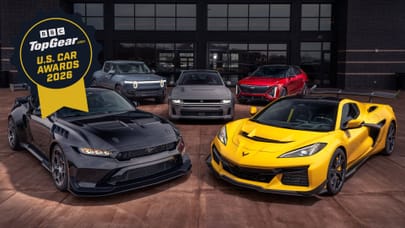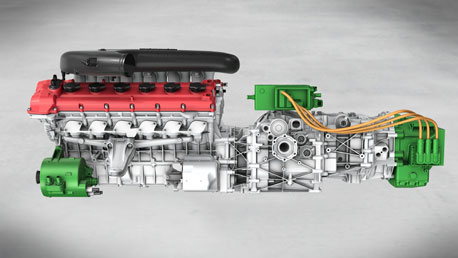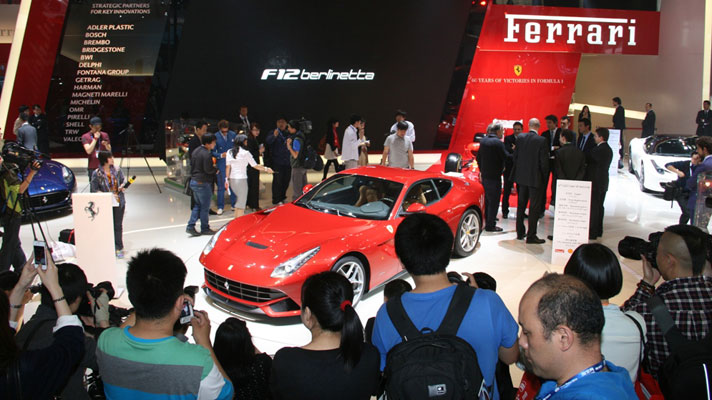
New Ferrari to get hybrid drivetrain
With the countdown to Ferrari's new Enzo supercar now firmly under way, the company chose the Beijing show to release some tantalising details about the powertrain underpinning what CEO Amedeo Felisa refers to as a ‘special model'.
While the V12 will be a development of the 731bhp 6.3-litre unit in the new F12, the big news is that the new car - which should break cover before the end of 2012, probably between the Paris and Detroit motor show - will use the latest evolution of Ferrari's Hy-Kers electric hybrid system first shown at Geneva two years ago.
"This is the best way to increase performance while reducing emissions," Felisa told TopGear.com at a packed and sticky Beijing show. "We are interested in down-sizing [turbocharging], in cylinder deactivation and in hybrid technology. This is also the best way of keeping the V12 engine architecture which, as you know, Ferrari is very committed to. Reducing the car's weight is not sufficient alone to reduce emissions: to do that you must work on the powertrain. Hybrid for Ferrari is not just about reducing emissions, it is about enhancing the experience of our cars. Otherwise we risk losing their fundamental character."
So expect the Hy-Kers system to increase the V12's performance by 10 per cent, while also being used to enhance a torque vectoring system, traction control, and brake force distribution, becoming fully integrated with Ferrari's already phenomenal chassis electronics. Under braking, the Kers re-assigns the kinetic energy to charge the batteries.
Felisa says that Ferrari's enormous F1 expertise has enabled them to master the challenge of ‘managing the marriage of electric power to an internal combustion engine'. The new system features a rear-mounted electric motor that assists the mid-mounted V12, while a second electric motor at the front is there solely to feed the ancillaries (power steering, air con) with a power converter in between.
Lithium ion batteries sit low in the chassis, and though this hardware adds around 100kg to the car's overall weight, Felisa insists that weight distribution remains optimal. "We studied very hard on the best place to put the extra mass so that it would not affect the dynamics of the car," he confirms. The main electric motor delivers its power via one of the gearbox's two clutches, maintaining a seamless, uninterrupted flow of energy, harmonising petrol and electric. Theoretically, the system could allow the car to run on electric power at low speed, but, as Felisa freely admits, "we don't like the idea of an electric Ferrari because one of our main characteristics is the sound of the engine. We imagine that the system will see the car always mixing the two power sources at the same moment." We couldn't agree more...
Though Ferrari remains cagey about the performance of the new car, Felisa confirms that the system shaves 10 per cent off the 0-124mph time, while cutting emissions by a whopping 40 per cent. In other words, whatever else the new Enzo is going to be, it'll be the fastest and cleanest Ferrari ever, with eye-popping CO2 numbers to go with outrageous performance. As odd as it might seem to get excited about this on Ferrari's long-awaited new supercar, we can't help pondering how low can the emissions go. Under 300g/km? In the low 200s? "Higher than a Fiat Panda or 500," Felisa says with a smile, "but certainly the lowest a Ferrari has ever been."
Insiders say that the new Enzo is a truly remarkable looking car, unlike anything Ferrari has ever done before. With an all carbon composite chassis, a hybrid V12 and the best chassis electronics in the business, it should be a genuine game-changer, and will do battle with McLaren's imminent P12, Porsche's hybrid-electric 918 Spyder, and Jaguar's Williams-developed C-X75. Naturally, it will be furiously expensive, not least because hybridisation at this level is a costly, challenging technology.
"We like the challenge," Felisa says. "We have always used our special cars to develop special new technology. Our supercar has always had a distinct typology, and our next car will maintain that approach. It is not a question of being invited to buy the car, but ownership will make you a member of a special club."
Quite possibly the understatement of the year.
Top Gear
Newsletter
Thank you for subscribing to our newsletter. Look out for your regular round-up of news, reviews and offers in your inbox.
Get all the latest news, reviews and exclusives, direct to your inbox.
Trending this week
- Car Review
BMW 1 Series
- Top Gear's Top 9
Nine dreadful bits of 'homeware' made by carmakers









